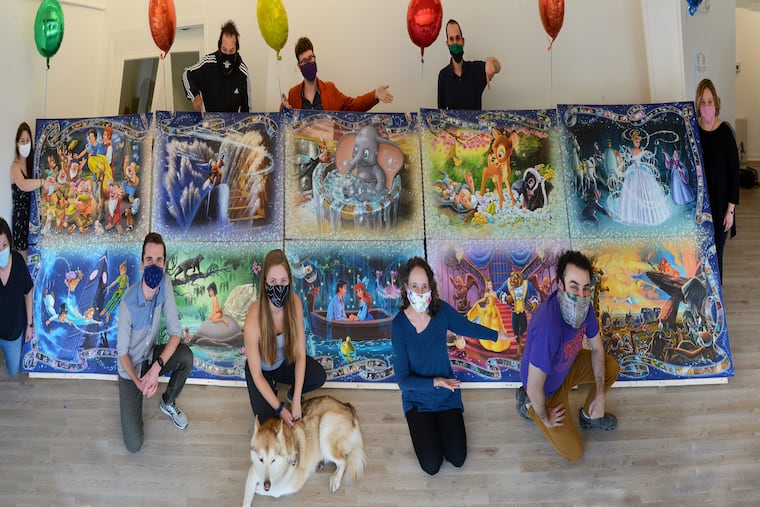This giant, collaborative jigsaw puzzle helped occupy participants during the pandemic
“Having that puzzle to work on,” said Malka Benjamin, one of the project’s participants, “I think is the reason I got through the shutdown in the mental form I’m in.”

While his peers gravitated to baseball fields and basketball courts growing up, David Leschinsky stayed home and fidgeted with any puzzle he could get his hands on.
To Leschinsky, there are few activities more relaxing than completing a puzzle. He loved jigsaws so much that he left the tech industry 16 years ago to start Eureka! Puzzles, a jigsaw store in Brookline, Mass.
When the coronavirus began consuming North Americans' attention in March, Leschinsky wanted others to have access to his go-to leisure activity during a time when many people were stuck in their homes. He distributed parts of a 40,320-piece puzzle to nearby residents, hoping to join the components when the health crisis subsided.
This jigsaw project was Eureka! Puzzles' way to build a small community and provide a fun activity for Massachusetts residents during the pandemic.
“Having that puzzle to work on,” said Malka Benjamin, one of the project’s participants, “I think is the reason I got through the shutdown in the mental form I’m in.”
Near the beginning of 2019, Eureka! Puzzles bought the jigsaw from Ravensburger, a German puzzlemaker, to add to its collection of more than 5,000 items. Until March, the largest jigsaw Eureka! Puzzles owned sat on a top shelf in the small store.
When glancing at it one day in March, Leschinsky asked his employees about distributing parts of the $600 puzzle to customers free. They thought nobody would be interested.
Instead, when Leschinksy sent an email to customers, he said more than 150 people replied. Leschinsky’s family took on a section, and he found nine other people near Brookline to whom he would send about 4,000 pieces of the puzzle. Participants picked up their puzzle pieces and a foam board at the store before it closed in late March.
Leschinsky created a social media hashtag, #EurekaTogetherApart, and asked contributors to share their progress on Instagram. Participants bonded over a common goal of completing a large puzzle, and they could share their shortcomings and achievements virtually.
“There is so much animosity in the world,” said Leschinsky, 65. “Things are so polarized that it always seems that everything is misaligned. You can still have them work together and make them work and all come together to create something that is bigger than any one of us. In some ways that’s what this puzzle is; it’s bigger than any of the individuals or the households that did this.”
Like Leschinsky, Benjamin has loved puzzles since she was a child. When she was about 10 years old, Benjamin grabbed dozens of puzzles from closets in her Newtown, Mass., home, and worked on them almost every minute of the day for two weeks, covering her entire living room.
Years later, she knew building puzzles was the best way to power through the pandemic.
After Benjamin poured out the puzzle pieces on her dining room table for the “Beauty and the Beast” section, she retrieved multiple bowls from her kitchen and sorted the pieces by color and pattern. She mostly worked on the puzzle during evenings and weekends. She would play “The Lonely Palette Podcast” or “Gastropod” and lose track of time.
When Benjamin felt frustrated or accomplished, she opened her Instagram to share her progress with other participants. About two months later, after she finished, she cheered on the remaining participants with virtual comments. Some of Benjamin’s friends felt antsy while prohibited from seeing friends or leaving their house.
“I never felt that way … because my evenings I would be able to sort of lose myself in the puzzle and not worry about how I’m not doing this or I’m not doing that,” said Benjamin, 35, who works at the Plimoth Plantation living history museum in Plymouth, Mass. “It was almost like a gift of time to be able to work on the puzzle.”
» READ MORE: Philly doctor shares lessons his grandmother taught him during the pandemic | Opinion
Massachusetts stores were allowed to reopen in June. It was perfect timing because that was around when everyone finished their contributions. Eureka! Puzzles employees picked up the sections and glued them together in their basement, creating a 22½-foot-long puzzle. In September, the store put it on display at a gallery next door, with all of the puzzle builders in attendance for the revealing.
A few months ago, Ravensburger sent another 40,000-piece jigsaw to Eureka! Puzzles — this one featuring Mickey Mouse photos through the decades. Leschinsky plans to distribute its sections soon — hoping it’ll help another 10 people escape troubles.